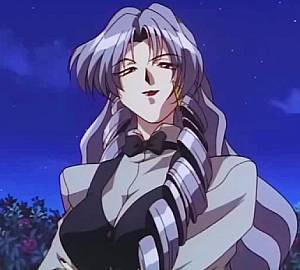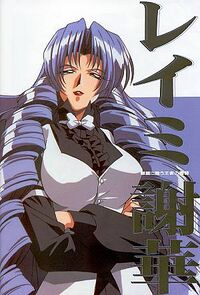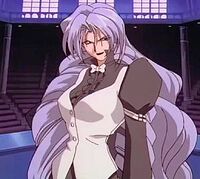Remi Ďana: Difference between revisions
(Created page with "{{Gylian name|Ďana|Remi}} {{Infobox sportsperson | name = Remi Ďana | image = RemiĎana1.jpg | birth_date = 3 June 1939 | birth_place = Na...") |
mNo edit summary |
||
| (One intermediate revision by the same user not shown) | |||
| Line 17: | Line 17: | ||
}} | }} | ||
'''Remi Ďana''' (3 May 1939 – 22 December 2009) was a Gylian [[Rezy|''rezliste'']]. She and her rival [[Irène LeRoi]] are widely considered two of the greatest and most influential ''rezloi'' of all time, and their careers are credited with establishing modern ''[[rezy]]''. | '''Remi Ďana''' (3 May 1939 – 22 December 2009) was a Gylian [[Rezy|''rezliste'']], actress, and voice actress. She and her rival [[Irène LeRoi]] are widely considered two of the greatest and most influential ''rezloi'' of all time, and their careers are credited with establishing modern ''[[rezy]]''. | ||
==Early life== | ==Early life== | ||
| Line 27: | Line 27: | ||
She made her ''rezy'' debut in 1958. She worked at the time as an [[elevator attendant]], and kept the job throughout her ''rezy'' career. She moved to Mişeyáke in 1961. She chose not to adopt a stage name, but initially struggled to develop her in-ring persona. | She made her ''rezy'' debut in 1958. She worked at the time as an [[elevator attendant]], and kept the job throughout her ''rezy'' career. She moved to Mişeyáke in 1961. She chose not to adopt a stage name, but initially struggled to develop her in-ring persona. | ||
She was inspired by [[Irène LeRoi]]'s breakthrough to national popularity, adopting a similarly formally-attired appearance for matches and crafting a [[Wicked–evil distinction|"wicked"]] image. For the latter, she drew inspiration from [[Julie Legrand]] and [[Iulia Edver]]. | She was inspired by [[Irène LeRoi]]'s breakthrough to national popularity, adopting a similarly formally-attired appearance for matches and crafting a [[Wicked–evil distinction|"wicked"]] image. For the latter, she drew inspiration from [[Julie Legrand]] and [[Iulia Edver]]. She let her hair grow long, extending it down to her legs with {{wpl|Artificial hair integrations|hair extensions}}, and dyed it purple, styling it into ringlets. | ||
Throughout 1963–1964, Remi emerged as an iconic figure in her own right, establishing herself as a major '' | Throughout 1963–1964, Remi emerged as an iconic figure in her own right, establishing herself as a major ''rezliste''. She became Irène's main opponent. Their legendary rivalry would continue for the rest of their career, and had a major impact on the sport itself and Gylian pop culture. | ||
===Rivalry=== | |||
[[File:RemiĎana2.jpg|thumb|right|200px|Poster for one of Remi's matches in [[Akashi]], 1966]] | [[File:RemiĎana2.jpg|thumb|right|200px|Poster for one of Remi's matches in [[Akashi]], 1966]] | ||
Remi became the archetypal [[Rezy#Characteristics|''anta'']] of ''rezy'', compared to Irène's [[Rezy#Characteristics|''prota'']]. Although they portrayed adversaries in the ring, they were friends in private, and cooperated closely on planning their matches. Their rivalry was one of contrasts: Remi's long-haired appearance was more feminine than Irène's, and Remi's more "earthbound" style of fighting contrasted with Irène's "high-flying", athletic one. Remi also wore {{wpl|tuxedo}}s with an inverted black–white colour scheme, furthering the contrast. | Remi became the archetypal [[Rezy#Characteristics|''anta'']] of ''rezy'', compared to Irène's [[Rezy#Characteristics|''prota'']]. Although they portrayed adversaries in the ring, they were friends in private, and cooperated closely on planning their matches. Their rivalry was one of contrasts: Remi's long-haired appearance was more feminine than Irène's, and Remi's more "earthbound" style of fighting contrasted with Irène's "high-flying", athletic one. Remi also wore {{wpl|tuxedo}}s with an inverted black–white colour scheme, furthering the contrast. | ||
| Line 36: | Line 37: | ||
Ironically, one of their contrasts was reversed in real life: Remi portrayed herself as larger-than-life, witty, arrogant, and inescapably attractive, but in fact worked as an elevator attendant and had a modest lifestyle. It was actually Irène who was employed in a bank and led the more ''[[georgette (term)|georgette]]'' lifestyle. | Ironically, one of their contrasts was reversed in real life: Remi portrayed herself as larger-than-life, witty, arrogant, and inescapably attractive, but in fact worked as an elevator attendant and had a modest lifestyle. It was actually Irène who was employed in a bank and led the more ''[[georgette (term)|georgette]]'' lifestyle. | ||
Remi carefully constructed her [[Wicked–evil distinction|"wicked"]] persona in order to make audiences take pleasure in disliking her. She portrayed herself as flamboyant, self-satisfied, and seemingly impervious to insults or jeers | ===Public image=== | ||
Remi carefully constructed her [[Wicked–evil distinction|"wicked"]] persona in order to make audiences take pleasure in disliking her. She portrayed herself as flamboyant, self-satisfied, and seemingly impervious to insults or jeers. | |||
She would enter the ring with an arrogant smile, and incite booing from the audience, to which she replied by bowing, blowing kisses, or thanking them and acting as if they were cheering. She addressed Irène with impeccably-mannered haughtiness during their banter, usually belittling her abilities and promising to not defeat her too badly. | |||
Throughout the 1960s and 1970s, Irène and Remi were a national pop culture phenomenon. They appeared in several films together, either reprising their rivalry in other contexts, or teaming up against a worse [[Adversary–enemy distinction|enemy]]. They were depicted on the cover of [[The Beaties]]' ''[[Sgt. Pepper's Lonely Hearts Club Band]]''. They both retired in 1978 after a final match that ended in a tie. | Remi joked that her job as ''anta'' was to be "the woman you love to hate". She sought to arouse a specific reaction from audiences: antipathy mixed with unwitting attraction, drawn to her "like a moth to a flame". | ||
She introduced elements of sexual tension and {{wpl|erotic sexual denial}} to her matches with Irène, and read extensively about {{wpl|gladiator}}s to refine her persona. She took pleasure in taunting audiences that their booing and heckling was a feeble attempt to mask their attraction to her. | |||
As her in-ring persona developed, she took to entering the ring accompanied by a small entourage, including her trainers and stylists, emphasising her presentation as arrogant, vain, and overconfident. | |||
In interviews, she enjoyed pointing out that her ''anta'' role was far more demanding and required extensive acting skills, in order to make hating her pleasurable for audiences. She described the ''anta'' as just as much "wish fulfilment" as the ''prota'': "The entire purpose of Remi Ďana is to draw power from hatred. That hatred is born of pure, beautiful envy. Remi Ďana represents your deepest, darkest desires — to be the centre of the world, to hoard it all for yourself, to get away with it. Trying to deny your dark side only strengthens Remi Ďana further." | |||
When meeting with fans, she kept up appearances by jokingly thanking them for their hatred, rather than their support. | |||
===Impact=== | |||
[[File:RemiĎana3.jpg|thumb|right|200px|Remi rehearsing for a match, 1969]] | |||
Throughout the 1960s and 1970s, Irène and Remi were a national pop culture phenomenon. They appeared in several films together, either reprising their rivalry in other contexts, or teaming up against a worse [[Adversary–enemy distinction|enemy]]. They were depicted on the cover of [[The Beaties]]' ''[[Sgt. Pepper's Lonely Hearts Club Band]]''. | |||
They both retired in 1978 after a final match that ended in a tie. | |||
==Retirement== | ==Retirement== | ||
After retirement, Remi continued working part-time as an elevator attendant, and pursued other interests. She also worked as a ''rezy'' trainer, actress, voice actress, and {{wpl|stunt performer}} and {{wpl|stunt coordinator}}. | After retirement, Remi continued working part-time as an elevator attendant, and pursued other interests. She also worked as a ''rezy'' trainer, actress, voice actress, and {{wpl|stunt performer}} and {{wpl|stunt coordinator}}. | ||
She was a prolific voice actress, taking advantage of the lack of filming that would show her aging, and took almost exclusively roles of [[Wicked–evil distinction|"wicked"]] villains that she had perfected as a ''rezliste''. | |||
==Death== | ==Death== | ||
| Line 52: | Line 70: | ||
She is considered one of the greatest archetypes of [[Wicked–evil distinction|"wickedness"]], and has inspired numerous others in this regard, ranging from other [[Rezy#Characteristics|''anta'']] to "wicked" fictional characters and [[Pornography in Gylias#Subgenres|pornography]]. Her persona has been used as a model for other famous Gylians with similarly tongue-in-cheek "wicked" public images, including [[Marie-Agnès Delaunay]] and {{G-ARENA/meta/shortname}} politicians. | She is considered one of the greatest archetypes of [[Wicked–evil distinction|"wickedness"]], and has inspired numerous others in this regard, ranging from other [[Rezy#Characteristics|''anta'']] to "wicked" fictional characters and [[Pornography in Gylias#Subgenres|pornography]]. Her persona has been used as a model for other famous Gylians with similarly tongue-in-cheek "wicked" public images, including [[Marie-Agnès Delaunay]] and {{G-ARENA/meta/shortname}} politicians. | ||
''[[Gylias Review]]'' wrote in 2009: "It's hardly a stretch to say that every [[Wicked–evil distinction|"wicked"]] villain to have graced the screens since the [[Liberation War (Gylias)|war]] is really a loving tribute to Remi. None would look the same without her gift for turning boundless arrogance into deliciously irresistible {{wpl|Camp (style)|camp}}." | |||
[[Category:Gylian sportspeople]] | [[Category:Gylian sportspeople]] | ||
Latest revision as of 16:11, 29 March 2022
 | |
| Personal information | |
|---|---|
| Born | 3 June 1939 Narona, Free Territories |
| Died | 22 December 2009 (aged 70) Mişeyáke, Mişeyáke, Gylias |
| Years active | 1958–1978 |
| Sport | |
| Country | Gylias |
| Sport | Rezy |
| Debut | 1958 |
| Retired | 1978 |
Remi Ďana (3 May 1939 – 22 December 2009) was a Gylian rezliste, actress, and voice actress. She and her rival Irène LeRoi are widely considered two of the greatest and most influential rezloi of all time, and their careers are credited with establishing modern rezy.
Early life
Remi Ďana was born on 3 May 1939 in Narona. She attended volunteer classes in the Free Territories.
She was an enthusiastic footballer and swimmer from an early age, and took dance lessons. She started studying karate aged 15, and discovered rezy as a result.
Career
She made her rezy debut in 1958. She worked at the time as an elevator attendant, and kept the job throughout her rezy career. She moved to Mişeyáke in 1961. She chose not to adopt a stage name, but initially struggled to develop her in-ring persona.
She was inspired by Irène LeRoi's breakthrough to national popularity, adopting a similarly formally-attired appearance for matches and crafting a "wicked" image. For the latter, she drew inspiration from Julie Legrand and Iulia Edver. She let her hair grow long, extending it down to her legs with hair extensions, and dyed it purple, styling it into ringlets.
Throughout 1963–1964, Remi emerged as an iconic figure in her own right, establishing herself as a major rezliste. She became Irène's main opponent. Their legendary rivalry would continue for the rest of their career, and had a major impact on the sport itself and Gylian pop culture.
Rivalry

Remi became the archetypal anta of rezy, compared to Irène's prota. Although they portrayed adversaries in the ring, they were friends in private, and cooperated closely on planning their matches. Their rivalry was one of contrasts: Remi's long-haired appearance was more feminine than Irène's, and Remi's more "earthbound" style of fighting contrasted with Irène's "high-flying", athletic one. Remi also wore tuxedos with an inverted black–white colour scheme, furthering the contrast.
Ironically, one of their contrasts was reversed in real life: Remi portrayed herself as larger-than-life, witty, arrogant, and inescapably attractive, but in fact worked as an elevator attendant and had a modest lifestyle. It was actually Irène who was employed in a bank and led the more georgette lifestyle.
Public image
Remi carefully constructed her "wicked" persona in order to make audiences take pleasure in disliking her. She portrayed herself as flamboyant, self-satisfied, and seemingly impervious to insults or jeers.
She would enter the ring with an arrogant smile, and incite booing from the audience, to which she replied by bowing, blowing kisses, or thanking them and acting as if they were cheering. She addressed Irène with impeccably-mannered haughtiness during their banter, usually belittling her abilities and promising to not defeat her too badly.
Remi joked that her job as anta was to be "the woman you love to hate". She sought to arouse a specific reaction from audiences: antipathy mixed with unwitting attraction, drawn to her "like a moth to a flame".
She introduced elements of sexual tension and erotic sexual denial to her matches with Irène, and read extensively about gladiators to refine her persona. She took pleasure in taunting audiences that their booing and heckling was a feeble attempt to mask their attraction to her.
As her in-ring persona developed, she took to entering the ring accompanied by a small entourage, including her trainers and stylists, emphasising her presentation as arrogant, vain, and overconfident.
In interviews, she enjoyed pointing out that her anta role was far more demanding and required extensive acting skills, in order to make hating her pleasurable for audiences. She described the anta as just as much "wish fulfilment" as the prota: "The entire purpose of Remi Ďana is to draw power from hatred. That hatred is born of pure, beautiful envy. Remi Ďana represents your deepest, darkest desires — to be the centre of the world, to hoard it all for yourself, to get away with it. Trying to deny your dark side only strengthens Remi Ďana further."
When meeting with fans, she kept up appearances by jokingly thanking them for their hatred, rather than their support.
Impact
Throughout the 1960s and 1970s, Irène and Remi were a national pop culture phenomenon. They appeared in several films together, either reprising their rivalry in other contexts, or teaming up against a worse enemy. They were depicted on the cover of The Beaties' Sgt. Pepper's Lonely Hearts Club Band.
They both retired in 1978 after a final match that ended in a tie.
Retirement
After retirement, Remi continued working part-time as an elevator attendant, and pursued other interests. She also worked as a rezy trainer, actress, voice actress, and stunt performer and stunt coordinator.
She was a prolific voice actress, taking advantage of the lack of filming that would show her aging, and took almost exclusively roles of "wicked" villains that she had perfected as a rezliste.
Death
She died on 22 December 2009 of a heart attack.
Legacy
Remi was one of Gylias' most famous rezloi, and was a sex symbol and pop culture icon with a significant impact both on her sport and broader Gylian popular culture.
She is considered one of the greatest archetypes of "wickedness", and has inspired numerous others in this regard, ranging from other anta to "wicked" fictional characters and pornography. Her persona has been used as a model for other famous Gylians with similarly tongue-in-cheek "wicked" public images, including Marie-Agnès Delaunay and ARENA politicians.
Gylias Review wrote in 2009: "It's hardly a stretch to say that every "wicked" villain to have graced the screens since the war is really a loving tribute to Remi. None would look the same without her gift for turning boundless arrogance into deliciously irresistible camp."
